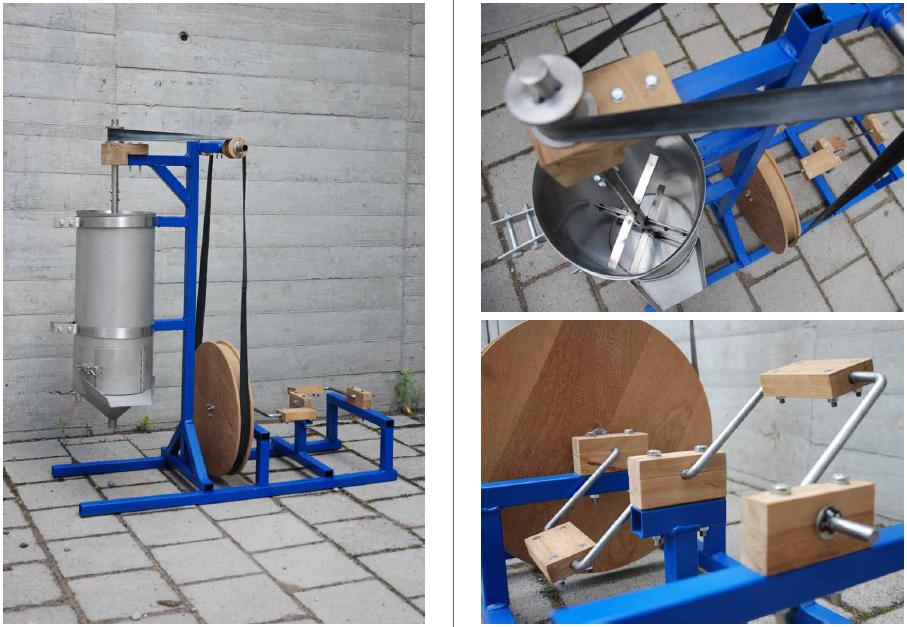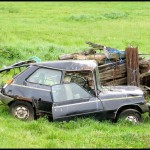Instead of installing an expensive motor, former Princeton student Eden Full is making a simple part that expands with heat, automatically moving a panel to its most electricty-generating position: The SunSalutor.
Celebrating the Luddite Uprisings
“November 2011 – January 2013 marks the 200th anniversary of the Luddite uprisings, in which artisan cloth workers smashed machines which were destroying their trades, undercutting wages and forcing them into unemployment and destitution. Today, the industrial system that the Luddites were rebelling against has led to climate change and huge losses of biodiversity, and its new technologies, such as information technology, genetic engineering and nanotechnology raise equally profound issues. Yet anyone who raises concern about the price and side-effects of new technologies is harshly condemned as a ‘luddite’, someone supposedly irrationally opposed to technology and progress.”
“In fact, the Luddites were not ‘luddites’ in that sense: the idea that they were opposed to all technology is a history written by the victors. In fact the Luddites opposed only technology ‘hurtful to Commonality’, ie. to the common good, rather than the narrow interests of the few. They destroyed some machines whilst leaving alone others in the same workshop. So being a luddite today means being a sceptic about the dogma of technology as progress, not about denying the real benefits of some technologies. It means insisting that the crucial decisions about which technologies are developed are made democratically, not just imposed by corporations and technocratic elites. And it means standing up for our own ideas of what progress really is.”
Help celebrate 200th anniversary of the Luddite uprising: Luddites at 200 website. See also: “Lessons of the Luddites“.
Lifting Tool for Carrying Plant Containers
 The tool shown here was designed for use in outdoor nurseries specializing in ornamental and bedding plants. At nurseries in California where it was tested, it reduced workers’ forward bending angle by as much as 47%.
The tool shown here was designed for use in outdoor nurseries specializing in ornamental and bedding plants. At nurseries in California where it was tested, it reduced workers’ forward bending angle by as much as 47%.
The time spent working at a forward-bent angle of more than 20 degrees was reduced by nearly half. Hand gripping effort was reduced by more than half. Lifting strain was reduced by 40%.
Workers reported less work-related pain when using the handles, and those who had the most severe symptoms at the start reported the most improvement.
When Low-Tech Goes IKEA
What happens when two industrial design students from Sweden end up in Kenya creating a pedal powered machine for small-scale farmers who are often illiterate and speak more than 60 languages? You get a do-it-yourself design that seems to have come out of the IKEA factories – pictoral manuals included.
“Made in Kenya”, the bachelor project of Niklas Kull and Gabriella Rubin, is a textbook example of low-tech made accessible to everybody, regardless of their native tongue and language skills.
Edible Insects and Insecticides
“Indeed, it is ironical that many international and non-governmental organisations try to save crops that contain no more than 14 percent protein by killing another food source (insects) that may contain up to 75 percent high-quality protein.”
Julieta Ramos-Elorduy in “Ecological implications of minilivestock“, red. Maurizio Paoletti, 2005.
See also: “Edible forest insects: humans bite back!!” (.pdf 4MB), Patrick Durst, Dennis Johnson, Robin Leslie, Kenichi Shono, Food and Agricultural Organization of the United Nations (FAO), 2010. Summary at the edible forest insects FAO-website. Previously: mass insect-farming.
Computers in Education
“The chief technology officer of eBay sends his children to a nine-classroom school here. So do employees of Silicon Valley giants like Google, Apple, Yahoo and Hewlett-Packard. But the school’s chief teaching tools are anything but high-tech: pens and paper, knitting needles and, occasionally, mud. Not a computer to be found. No screens at all. They are not allowed in the classroom, and the school even frowns on their use at home.”
Read more: A Silicon Valley School That Doesn’t Compute. Hat tip to Kris Peeters.







